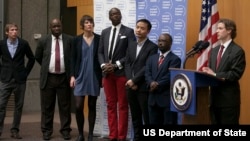The United States is committed to the promotion and defense of freedom of expression and assembly, two fundamental human rights that are as important online as they are in the public square.
Recognizing the interplay between these rights and their promotion and protection on the Internet, the U.S. Department of State recently welcomed the 2013 Internet Freedom Fellows to Washington, D.C.
The six human rights activists from across the globe began their program in Geneva, participating in meetings with other human right activists and experts, diplomats, media and civil society. In Washington, D.C., they met with U.S. State Department officials, civil society groups, and others. The Fellows concluded their program in California’s Silicon Valley with meetings with leading technology companies.
The Internet Freedom Fellows program, in its third year, is sponsored by the U.S. Mission to the United Nations in Geneva. David Kennedy, Counselor for Public Affairs at the Mission, said that while the fellows are a very diverse group, they share a common passion:
“They all share one thing: their commitment to freedom of expression, to the importance of freedom of expression in their work and the promotion of human rights and the promotion of democratic values in their countries.”
A key theme this year, was “Securing Human Rights Online”. Throughout the trip, the Fellows shared their personal stories and on-the-ground experience using the Internet to promote human rights. They discussed crackdowns on Internet freedom in various countries; digital security for rights activists; and the use of social media and digital storytelling to raise awareness of human rights issues.
They discussed the importance of keeping internet an open forum, and keeping ownership and governance in the hands of open organizations.
Their passion, said Mr. Kennedy, is inspiring:
“They tell their stories about why it is so important that we continue to protect freedom of expression that this is such a fundamental issue of the 21st century for all of us in the 21st century and we have to hear it from their voices -- from real human rights defenders on the ground.”
Recognizing the interplay between these rights and their promotion and protection on the Internet, the U.S. Department of State recently welcomed the 2013 Internet Freedom Fellows to Washington, D.C.
The six human rights activists from across the globe began their program in Geneva, participating in meetings with other human right activists and experts, diplomats, media and civil society. In Washington, D.C., they met with U.S. State Department officials, civil society groups, and others. The Fellows concluded their program in California’s Silicon Valley with meetings with leading technology companies.
Throughout the trip, the Fellows shared their personal stories and on-the-ground experience using the Internet to promote human rights.
The Internet Freedom Fellows program, in its third year, is sponsored by the U.S. Mission to the United Nations in Geneva. David Kennedy, Counselor for Public Affairs at the Mission, said that while the fellows are a very diverse group, they share a common passion:
“They all share one thing: their commitment to freedom of expression, to the importance of freedom of expression in their work and the promotion of human rights and the promotion of democratic values in their countries.”
A key theme this year, was “Securing Human Rights Online”. Throughout the trip, the Fellows shared their personal stories and on-the-ground experience using the Internet to promote human rights. They discussed crackdowns on Internet freedom in various countries; digital security for rights activists; and the use of social media and digital storytelling to raise awareness of human rights issues.
They discussed the importance of keeping internet an open forum, and keeping ownership and governance in the hands of open organizations.
Their passion, said Mr. Kennedy, is inspiring:
“They tell their stories about why it is so important that we continue to protect freedom of expression that this is such a fundamental issue of the 21st century for all of us in the 21st century and we have to hear it from their voices -- from real human rights defenders on the ground.”






